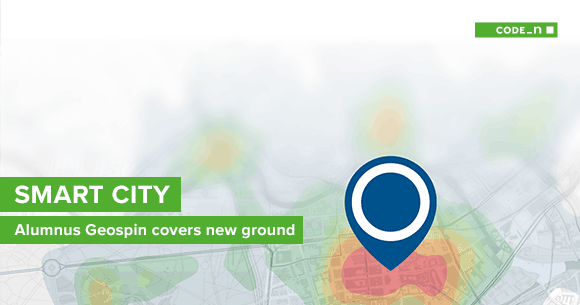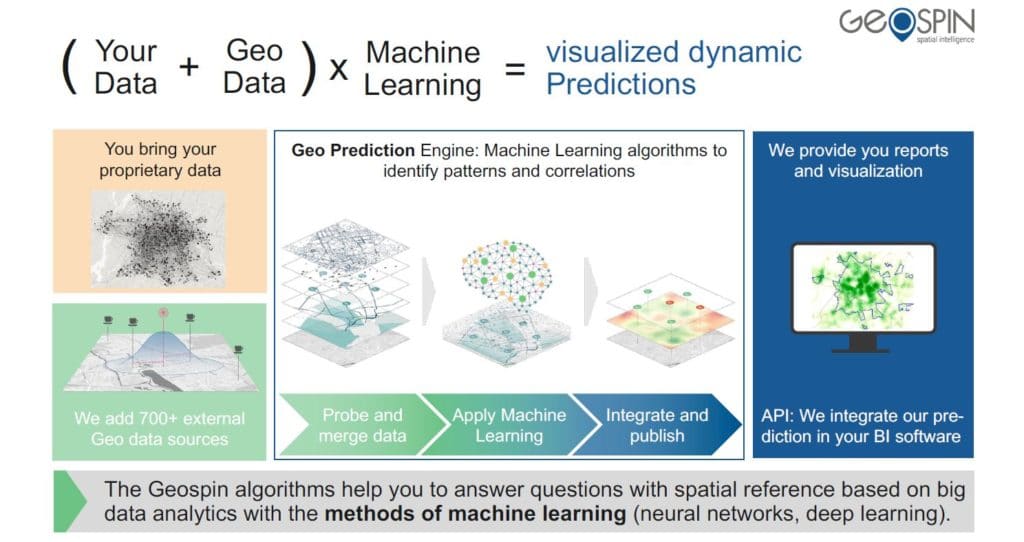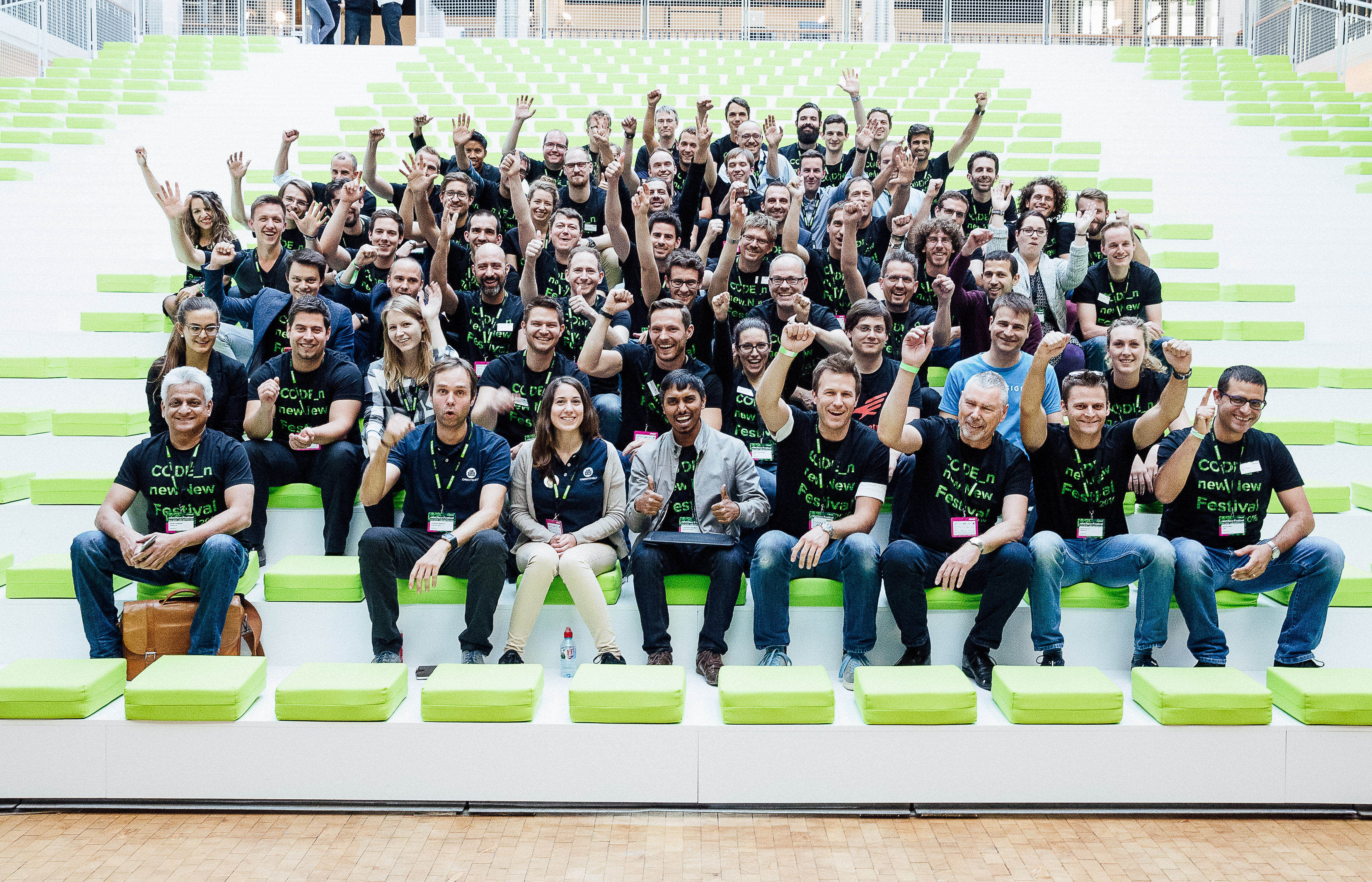Philipp Behrends of Geospin: “To find the right answers, we first discuss the right questions.”
 The University of Freiburg spin-off Geospin exploits the full potential of geospatial data by turning them into powerful predictions with the help of machine learning algorithms. Their mission is to provide the best in time and location to corporate companies based on data. The CODE_n16 finalist made its debut in the Connected Mobility cluster at the new.New Festival 2016 enabling companies to profit from their own digital resources by adding various Geo data and making it valuable to society – unlocking the potential, bringing intelligence to the data.
The University of Freiburg spin-off Geospin exploits the full potential of geospatial data by turning them into powerful predictions with the help of machine learning algorithms. Their mission is to provide the best in time and location to corporate companies based on data. The CODE_n16 finalist made its debut in the Connected Mobility cluster at the new.New Festival 2016 enabling companies to profit from their own digital resources by adding various Geo data and making it valuable to society – unlocking the potential, bringing intelligence to the data.
Two years later we connected again to discuss their partnerships with big companies like Deutsche Bahn and Thüga AG and their expansion from a small startup into a successful company. In our chat with Philipp Behrends, (Sales and Key Account Management) we learned about their recent developments and success in receiving a seven-figure funding for their geo-analytics methods.
Jessica: Hi Philipp! It’s great to catch up with you again. In a few paragraphs, what is Geospin?
Philipp: We are a University of Freiburg spin-off. Geospin contributes to Smart Cities becoming reality. The Geospin algorithms help you to answer questions with spatial reference based on big data analytics with the methods of machine learning. We are experts in providing predictions, in particular in the fields of mobility, real estate, insurance and municipal planning. Our five founders hold doctor degrees in the Smart City cluster. At present, a dozen data scientists and developers are working on refining our AI algorithms.
Jessica: You’ve been working with various top companies and recently landed an investement from Thüga and the High-Tech Gründerfonds. Congratulations! Can you tell us about the developments of Geospin since the new.New Festival 2016?
Philipp: Industry partners such as Siemens, Bosch and Deutsche Bahn or Thüga AG now rely on Geospin Predictive Analytics. Deutsche Bahn (DB) are regular customers for whom we analyzed reliability of the train network to help predict possible future disturbances and circumnavigations for a suburban rail network.
One of the products we developed in the past month is the automated optimization of the best location of charging stations. We have had some successful projects with Thüga, which is a utility provider company in municipalities. Together with Thüga, Geospin analyzes the infrastructure of charging stations and user acceptance of electric vehicles in cooperation with the Smartlabs platform. Our charging station analysis is our first ready-to-order product. It takes into account different features to make better decisions on where to place a charging station. We feed data sources into a machine learning algorithm followed by patterns of the city or municipal landscape. The algorithm determines the best the best places to setup a charging station. In addition, we display the attractiveness of all city areas on a heatmap.
A major highlight in June this year was that Geospin received a seven-figure funding. While Sebastian and his co-founders had already developed the company into a successful startup, the team has grown to 20 employees working in Freiburg and Hamburg.
Jessica: How do you usually engage with customers?
Philipp: We follow the motto: “To find the right answers, we first discuss the right questions.” Our clients are usually seeking answers to the Where? or When? questions. Where to find new customers? Where and when are the best chances for growth? Self-learning algorithms transfer existing patterns from historic data to areas our customers wish to move into. The algorithms forecast usage and success chance for the perimeter and location in question. We thus take the data of clients and add value by bringing intelligence to the data.
Jessica: A catchy phrase you use is “Be Smart. Be where profits grow.” How have you achieved this?
Philpp: Our unique selling proposition (USP) is the highly precise prediction on where and when a demand will arise. This helps our customers to better place their services. We help them maximize utilization of car sharing vehicles. We indicate top spots for e-vehicle charging stations. We predict the best time to harvest crop. We optimize public transport networks.

Jessica: Can you describe your experience from starting as a small team and growing into a successful startup?
Philipp: We started as a Smart City research group at the University of Freiburg. Once we decided to launch Geospin, we had to learn the tools of running a business on-the-job. Most of the team comes from a research background and we had a sharp learning curve, which was challenging and fun at the same time. In 2016, we started with the support of a University sponsorship, which served as a good ‘kick-off’ in starting Geospin. We extended our team in 2018 when we decided to take external investors on board and are now a team with 20 full-time staff members.
Jessica: What have been the biggest obstacles you’ve encountered?
Philipp: There are many interesting startups in Germany who are competing for the best employees. Recruitment thus is a challenge for us, since we only hire people who contribute to the good Geospin team vibe. Our company locations in Freiburg – a vibrant student city (and by the way the city with the most sun hours in Germany) in the heart of the Black Forest – and in the maritime capital Hamburg are quite attractive for young talents who seek a good work-life-balance. At the moment, we are hiring, so get in touch with us!
Jessica: What added features can customers expect from you in the near future?
Philipp: We use an API interface to integrate and visualize our prognoses in the customer business intelligence software and are developing and working on a Geo Prediction Engine that takes spatial predictive analytics to the next level by identifying the most valuable machine learning approach individually for every client request. Geospin delivers B2B products for the key industries like smart mobility, real estate, municipalities. Our first solutions are already up and running!
Jessica: In which direction do you think big data analytics is headed?
Philipp: The combination of various data pools becomes essential to derive even more relevant insights on the optimal usage of public infrastructure and on customer behaviour. We believe that machine learning algorithms will become more and more powerful, yet complex. Geospin will play a frontline role in this development with our close intertwining with Universities of Freiburg, Rotterdam and London and our connections to various specialized research councils and projects. Also, we are driven to provide the most efficient state-of-the-art solutions to our clients.
Jessica: Such exciting developments! It was lovely to catch up with you and we’re looking forward to your talk at the new.New Festival 2018 in October.






Write a comment